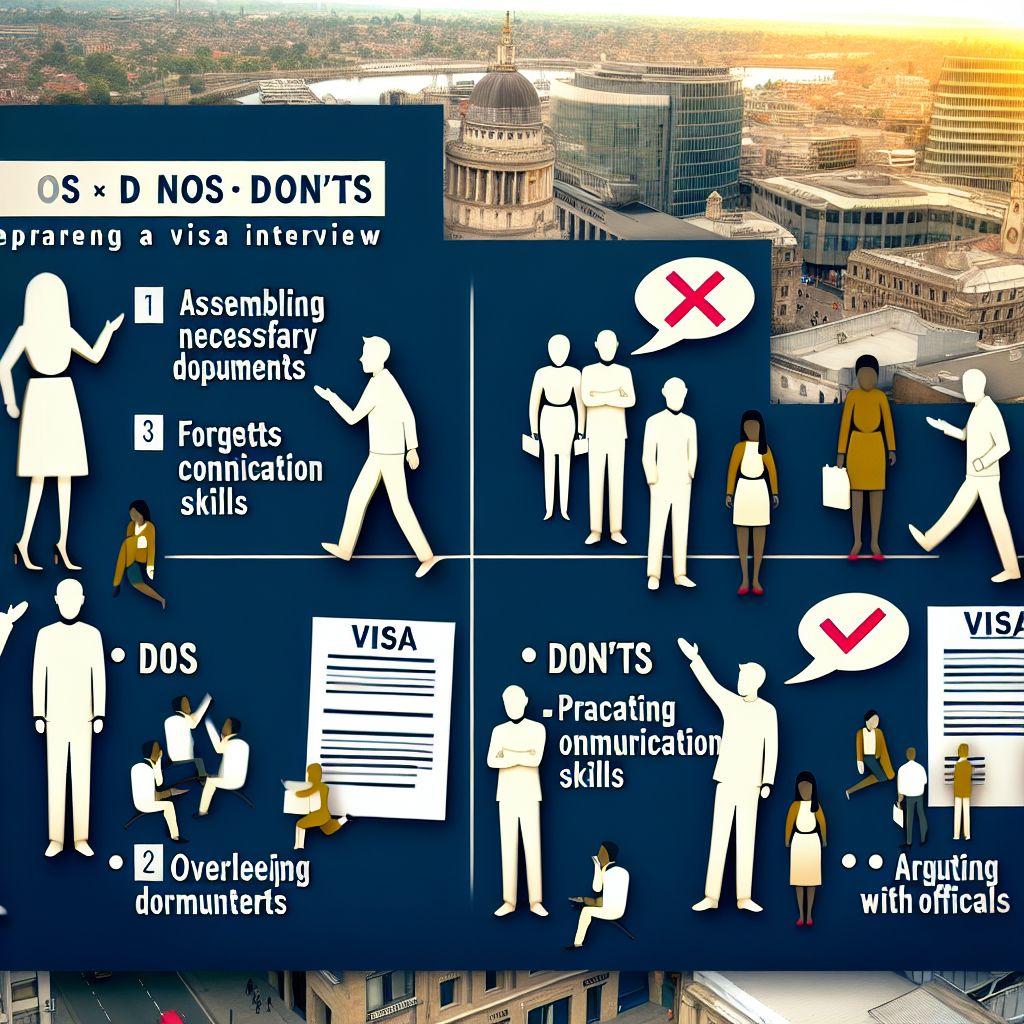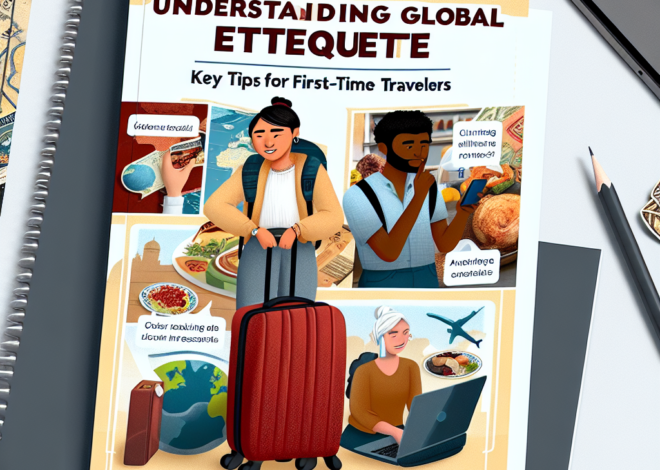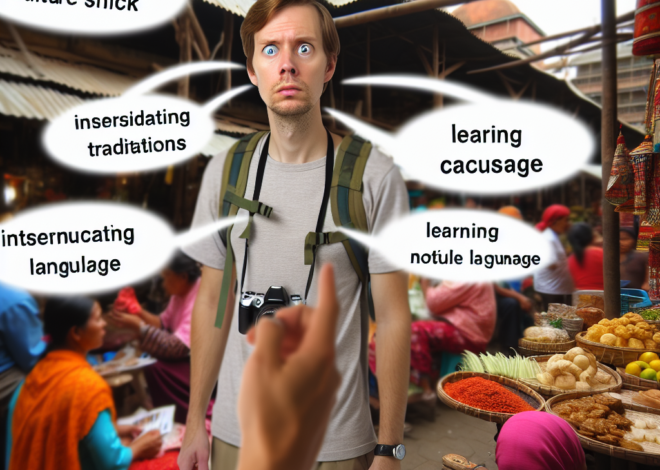
Preparing for a visa interview: Dos and Donts
-
Table of Contents
“Visa Interview Success: Master the Dos and Avoid the Don’ts”
Introduction
Preparing for a visa interview is a crucial step in the process of securing permission to enter a foreign country. Whether you are applying for a tourist, student, or work visa, the interview can be a pivotal factor in the approval process. It is essential to approach this interview with a clear understanding of what is expected and how best to present yourself. Knowing the dos and don’ts can help you make a positive impression on the consulate officer, increase your chances of success, and reduce the likelihood of unnecessary stress or mistakes during the interview. This guide will outline key strategies and common pitfalls to avoid, helping you navigate the complexities of the visa interview process with confidence.
Top 10 Dos and Don’ts for Acing Your Visa Interview
Preparing for a visa interview can be a daunting task, but with the right approach and mindset, you can navigate this crucial step towards your international travel or relocation plans. To help you ace your visa interview, here are the top 10 dos and don’ts that you should keep in mind.
Firstly, it is essential to do thorough research about the visa process for your specific destination country. Understanding the specific requirements and expectations can significantly boost your confidence and prepare you for the types of questions that might be asked. Additionally, ensure that all your documents are in order, including passports, application forms, financial statements, and any other required paperwork. Presenting complete and organized documentation is crucial as it reflects your attention to detail and seriousness about your application.
Moreover, practicing your responses to common interview questions is another vital preparation step. While it is important to be prepared, remember to be honest in your answers. Fabricating details during your interview can lead to a denial of your visa application. Instead, focus on clear and concise responses that directly address the interviewer’s questions.
On the day of the interview, dressing appropriately is a significant consideration. Opt for business or business casual attire that shows you take the interview seriously. This not only impacts how you are perceived but also helps in boosting your confidence.
Punctuality is another critical aspect. Arriving on time, or even a few minutes early, for your appointment demonstrates your respect for the interviewer’s time and your commitment to the process. This small but crucial detail can set a positive tone for the entire interaction.
During the interview, be polite and maintain a calm demeanor. It is natural to feel nervous, but practicing good manners and showing respect can go a long way. Make eye contact, listen carefully, and avoid interrupting the interviewer. These subtle cues play an essential role in establishing a positive rapport.
Conversely, there are several pitfalls you should avoid. Do not provide unnecessary information or go off on tangents when answering questions. Keep your answers relevant and to the point to show that you are focused and understand the questions being asked.
Avoid showing signs of frustration or impatience during the interview. Sometimes, the process can be lengthy or repetitive, but maintaining a composed and professional demeanor is crucial. Remember, the way you handle stress and frustration can also be evaluated during these interviews.
Do not forget to express your intent clearly. Whether you are traveling for tourism, work, or study, be clear about your purpose. Ambiguity in your answers can lead to doubts about your intentions, which is not favorable in a visa interview setting.
Lastly, after the interview, it is polite to thank the interviewer for their time and consideration. This not only shows good manners but also reinforces your interest and enthusiasm for visiting the country.
By adhering to these dos and don’ts, you can enhance your chances of success in your visa interview. Preparation, politeness, and clarity are your best tools in this process. Remember, the goal is to demonstrate that you are a credible, honest, and well-prepared applicant.
Essential Documents Checklist for Your Visa Interview
Preparing for a visa interview can be a daunting task, but with the right preparation and understanding of what is required, you can significantly enhance your chances of success. One of the most critical aspects of this preparation is ensuring you have all the essential documents organized and ready for presentation. This checklist will guide you through the necessary paperwork you need to gather to avoid any last-minute hurdles that could jeopardize your application.
First and foremost, your passport is the cornerstone of your travel documentation. It must be valid for at least six months beyond the date of your intended return. Ensure that it has at least two blank pages for visa stamps. If your passport does not meet these criteria, you should renew it well in advance of your interview date.
Next, you will need to provide proof of the visa interview appointment. This usually comes in the form of an interview confirmation letter or email that you receive after scheduling your appointment. This document is crucial as it confirms your slot and provides details about the date, time, and location of your interview.
Another vital document is your visa application form, typically completed online. It is imperative to print a copy of this form once you have filled it out. Double-check all the information to ensure accuracy and completeness. Any discrepancies between what is declared in the application form and what is communicated during the interview can lead to delays or even a denial of your visa.
Photographs are also required and must meet the specifications provided by the embassy or consulate. These specifications often include particular dimensions and background color, so it is important to adhere strictly to these guidelines. Incorrect photographs can cause unnecessary delays in the processing of your visa application.
Financial stability is another critical area assessed during the visa interview. Therefore, you must provide evidence of your financial means to cover your stay in the destination country. This can include bank statements, pay slips, or proof of investments. If someone else is sponsoring your trip, you will need a letter from them along with their financial documents.
Additionally, if you are visiting for business or educational purposes, documents supporting the reason for your visit are required. For students, this could be an admission letter from the institution, while business travelers might need an invitation letter from the company they are visiting or a letter from their employer detailing the purpose of the trip.
For those who have traveled previously, showing your travel history can be beneficial. This includes visas from previous trips and stamps in your passport. These documents demonstrate your compliance with other countries’ immigration laws, which can positively influence the consular officer’s decision.
Lastly, depending on the country of destination, there may be specific requirements such as vaccination records or additional forms. It is crucial to check the embassy’s official website or contact them directly to ensure no additional documents are needed.
In conclusion, gathering all necessary documents for your visa interview is a fundamental step in the visa application process. By meticulously preparing and organizing these documents, you demonstrate your seriousness and commitment to adhering to the visa requirements, thereby increasing your chances of a successful interview. Remember, the key is to be thorough, accurate, and timely in your preparations.
Common Visa Interview Mistakes and How to Avoid Them
Preparing for a visa interview can be a daunting task, especially for those who are doing it for the first time. The interview is a crucial step in the visa application process, and it is essential to make a good impression. However, many applicants make common mistakes that can jeopardize their chances of securing a visa. Understanding these pitfalls and learning how to avoid them can significantly enhance your preparation.
One of the most frequent errors made by visa applicants is failing to provide complete and accurate documentation. The documents you submit must support your application and demonstrate your eligibility for the visa. It is imperative to double-check that all required documents are not only present but also correctly filled out and up to date. Missing or incorrect paperwork can lead to unnecessary delays or even a denial of your application. Therefore, it is advisable to organize your documents well in advance of the interview date, allowing ample time to rectify any issues.
Another common mistake is not practicing for the interview. While it might seem straightforward, the interview can be challenging, particularly if you are not prepared for the types of questions that might be asked. These questions often pertain to your background, your purpose for visiting, and your plans after the visit. Practicing your responses can help you appear more confident and articulate during the actual interview. It is beneficial to conduct mock interviews with friends or family members who can provide feedback and help you improve your delivery.
Moreover, many applicants undermine the importance of their appearance and punctuality on the day of the interview. It is crucial to dress formally and arrive on time. Your appearance should convey professionalism and respect for the interviewer and the process. Being late can not only give a poor first impression but also indicate a lack of seriousness about the application process. To avoid this, plan your route and timing in advance, considering any potential delays.
Additionally, some applicants fail to adequately explain the reasons for their travel or their intentions to return to their home country after their visit. Visa officers need to be convinced that you have strong ties to your home country, such as a job, family, or property, which will likely ensure your return. Vague or unconvincing answers can raise doubts about your intentions. It is therefore essential to be clear and concise in your responses, providing specific examples that demonstrate your ties and commitments.
Lastly, a significant mistake is not being honest during the interview. Any form of dishonesty, whether about your personal circumstances, travel plans, or documents, can lead to a visa denial. Visa officers are trained to detect inconsistencies in your story; thus, maintaining honesty throughout the process is paramount.
In conclusion, while the visa interview can seem intimidating, avoiding these common mistakes can help you prepare more effectively. By ensuring your documentation is complete, practicing your responses, dressing appropriately, arriving on time, clearly articulating your travel intentions, and being honest, you can improve your chances of a successful visa interview. Remember, thorough preparation is key to overcoming the challenges of this crucial step in your travel plans.
How to Prepare for Tough Questions in a Visa Interview
Preparing for a visa interview can be a daunting task, especially when it comes to handling tough questions. These questions are designed to verify your intentions, your financial stability, and your ties to your home country. To navigate this crucial part of the visa application process successfully, it is essential to approach it with thorough preparation and a clear understanding of what is expected.
Firstly, it is important to familiarize yourself with the common types of questions that are asked during a visa interview. These can range from inquiries about your travel itinerary, your job, educational background, to questions about family and your reasons for returning to your home country after your visit. Understanding the purpose behind these questions can significantly aid in crafting clear, concise, and honest responses.
One effective strategy is to practice your answers. However, while it is beneficial to prepare, it is crucial to avoid memorizing answers as this can come off as insincere. Instead, focus on key points that you want to convey in your responses. This preparation will help you to remain calm and collected during the interview, ensuring that your answers are both thoughtful and pertinent.
Moreover, it is vital to be honest in your responses. Visa officers are trained to detect evasion or deceit, and being caught in a lie can result in immediate denial of your visa. If you do not know the answer to a question, it is perfectly acceptable to admit this rather than providing misleading information. Honesty reflects integrity and helps build trust with your interviewer.
Additionally, clarity and brevity should be your guiding principles when answering questions. Visa interviews are typically brief, and being able to communicate effectively in a concise manner is crucial. Avoid overly complicated explanations and focus on answering the question directly. This not only demonstrates your ability to communicate effectively but also shows respect for the interviewer’s time.
It is also advisable to prepare documentation that supports your answers. For instance, if you are asked about your financial status, having recent bank statements or sponsorship letters at hand can be beneficial. Similarly, if your travel is related to work or study, presenting an invitation letter from the company or educational institution can help substantiate your claims. Having these documents organized and ready to present when requested can significantly smooth the process.
Furthermore, understanding the cultural nuances and expectations of the interview can play a significant role in your preparation. For example, maintaining eye contact might be considered a sign of confidence and honesty in many Western cultures, whereas it might be seen differently in other parts of the world. Being aware of such details can help in making a positive impression.
Lastly, it is important to approach the interview with a positive mindset. Preparing for potential questions and answers is crucial, but so is maintaining a calm and positive demeanor. Stress and nervousness can hinder your ability to communicate effectively, so it is beneficial to engage in techniques that help manage anxiety, such as deep breathing or positive visualization.
In conclusion, preparing for tough questions in a visa interview requires a combination of honest self-assessment, thorough preparation of your background and documents, and effective communication skills. By anticipating the types of questions asked, practicing clear and honest responses, and maintaining a composed demeanor, you can enhance your chances of a successful visa interview outcome.
Dressing for Success: What to Wear to a Visa Interview
Preparing for a visa interview can be a daunting task, with applicants often wondering how to make the best impression. One crucial aspect that sometimes gets overlooked is the importance of dressing appropriately for the occasion. The way you dress for your visa interview can significantly influence the outcome, as it reflects your seriousness and professionalism regarding the application process.
When deciding what to wear to a visa interview, it’s essential to aim for a look that is both professional and conservative. This means choosing attire that is not only neat and tidy but also appropriate for a formal business environment. For men, this typically involves wearing a suit and tie or at least a dress shirt with formal trousers. A dark-colored suit with a light-colored shirt is a classic and safe choice. It’s important to ensure that clothes are well-fitted and not overly flashy. Shoes should be formal, clean, and polished. Avoid wearing sneakers, sandals, or any footwear that is too casual.
For women, a knee-length skirt or dress pants paired with a conservative blouse is advisable. Colors should be neutral, such as black, navy, or gray, which are universally accepted as professional. Women should avoid overly bright colors and large, distracting patterns. Footwear should be formal; closed-toe pumps are a typical choice. It is also important for women to keep makeup and jewelry minimal and understated, enhancing their natural look without overshadowing their overall presentation.
Moreover, personal grooming should not be neglected. Both men and women should ensure that their hair is neatly styled and that nails are clean and trimmed. A well-groomed appearance sends a message of respect and attention to detail, qualities that are highly regarded in any formal setting.
It is also worth considering the cultural context of the country where the embassy or consulate is located. Different countries may have different norms and expectations when it comes to dress code. Therefore, researching beforehand to understand these nuances can be very beneficial. For instance, some cultures might expect more conservative dress than others, which might influence your choice of attire for the interview.
While dressing appropriately is important, it is equally crucial to ensure that you are comfortable in what you are wearing. Being physically uncomfortable can distract and prevent you from focusing on the interview questions. Therefore, it is advisable to choose clothing and shoes that fit well and allow you to sit and walk comfortably.
In conclusion, dressing for success for a visa interview involves more than just picking out clothes that look good. It requires thoughtful consideration of the message you wish to convey to the interviewer. A professional and conservative outfit not only shows respect for the process but also boosts your confidence, a key component in any interview situation. By carefully selecting appropriate attire, you ensure that you present yourself in the best possible light, making a positive impression that could be crucial in the decision-making process. Remember, the goal is to demonstrate that you are a serious and well-prepared applicant, and your attire is a fundamental part of that representation.



